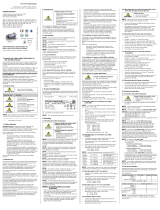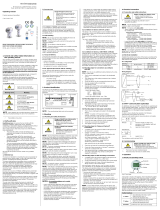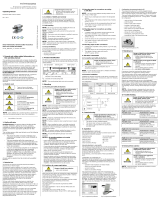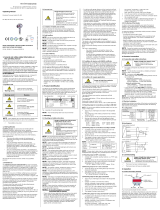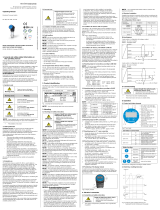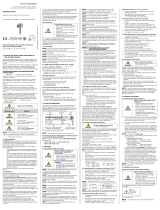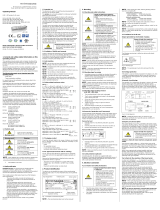Page is loading ...

Operating Manual
Electronic OEM Pressure Switch Pneumatics
CCP-S-4
READ THOROUGHLY BEFORE USING THE DEVICE
KEEP FOR FUTURE REFERENCE
1. General and safety-related information on
this operating manual
This operating manual enables safe and proper handling of the
product, and forms part of the device. It should be kept in close
proximity to the place of use, accessible for staff members at
any time.
All persons entrusted with the mounting, installation, putting into
service, operation, maintenance, removal from service, and
disposal of the device must have read and understood the
operating manual and in particular the safety-related information.
Complementary to this operating manual the current data sheet
has to be adhered to.
In addition, the applicable accident prevention regulations,
safety requirements, and country-specific installation standards
as well as the accepted engineering standards must be
observed.
1.1 Symbols used
Warning word
- Type and source of danger
- Measures to avoid the danger
Warning word Meaning
DANGER
- Imminent danger!
- Non-compliance will result in
death or serious injury.
WARNING
- Possible danger!
- Non-compliance may result in
death or serious injury.
CAUTION
- Hazardous situation!
- Non-compliance may result in
minor or moderate injury.
NOTE - draws attention to a possibly hazardous situation that
may result in property damage in case of non-compliance.
ü Precondition of an action
1.2 Staff qualification
Qualified persons are persons that are familiar with the
mounting, installation, putting into service, operation,
maintenance, removal from service, and disposal of the
product and have the appropriate qualification for their
activity.
This includes persons that meet at least one of the following
three requirements:
- They know the safety concepts of metrology and
automation technology and are familiar therewith as
project staff.
- They are operating staff of the measuring and
automation systems and have been instructed in the
handling of the systems. They are familiar with the
operation of the devices and technologies described
in this documentation.
- They are commissioning specialists or are employed
in the service department and have completed
training that qualifies them for the repair of the
system. In addition, they are authorized to put into
operation, to ground, and to mark circuits and
devices according to the safety engineering
standards.
All work with this product must be carried out by qualified
persons!
1.3 Intended use
The devices are used to convert the physical parameter of
pressure into an electric signal.
The electronic pressure switch CCP-S-4 has been designed for
pneumatics and vacuum applications. Due to the materials
aluminium for the pressure port and silicon for the pressure
sensor, the CCP-S-4 is suited for use with non-aggressive gases
or compressed air. The housing for the switching electronics
consists of PA 6.6. The new microcontroller switching
electronics offer – besides the standard functions – many
additional features for an optimal adaptation to the measuring
requirements. The one or two freely programmable contacts
whose status is indicated by differently coloured LEDs can be
quickly and comfortably configured either by means of the
optionally available configuration kit CIS 680 or CIS 681 or the
programming device P6.
The user must check whether the device is suited for the
selected use. In case of doubt, please contact our sales
The manufacturer assumes no liability for any wrong selection
and the consequences thereof!
Permissible media are compressed air and non-aggressive
gases, which are compatible with the media wetted parts
described in the data sheet.
The technical data listed in the current data sheet are engaging
and must absolutely be complied with. If the data sheet is not
available, please order or download it from our homepage:
http://www.simex.pl
WARNING
Danger through incorrect use
- In order to avoid accidents, use the
device only in accordance with its
intended use.
1.4 Limitation of liability and warranty
Failure to observe the instructions or technical regulations,
improper use and use not as intended, and alteration of or
damage to the device will result in the forfeiture of warranty
and liability claims.
1.5 Safe handling
NOTE - Do not use any force when installing the device to
prevent damage of the device and the plant!
NOTE - Treat the device with care both in the packed and
unpacked condition!
NOTE - The device must not be altered or modified in any way.
NOTE - Do not throw or drop the device!
NOTE - Excessive dust accumulation (over 5 mm) and
complete coverage with dust must be prevented!
NOTE - The device is state-of-the-art and is operationally
reliable. Residual hazards may originate from the device if it is
used or operated improperly.
1.6 Scope of delivery
Check that all parts listed in the scope of delivery are included
free of damage, and have been delivered according to your
purchase order:
- CCP-S-4
- mounting instructions
2. Product identification
The device can be identified by its manufacturing label. It provides
the most important data. By the ordering code the product can be
clearly identified.
Fig. 1: Manufacturing label
NOTE - The manufacturing label must not be removed!
3. Mounting
3.1 Mounting and safety instructions
DANGER
Danger of death from airborne parts,
leaking fluid, electric shock
- Always mount the device in a
depressurized and de-energized
condition!
DANGER
Danger of death from improper
installation
- Installation must be performed only by
appropriately qualified persons who
have read and understood the user
manual.
NOTE - If there is increased risk of damage to the device by
lightning strike or overvoltage, increased lightning protection
must additionally be provided!
NOTE - Do not remove the packaging or protective caps of the
device until shortly before the mounting procedure, in order to
exclude any damage to the diaphragm and the threads!
Protective caps must be kept! Dispose of the packaging
properly!
NOTE - Treat any unprotected diaphragm with utmost care;
this can be damaged very easily.
NOTE - Provide a cooling line when using the device in steam
piping.
NOTE - When installing the device, avoid high mechanical
stresses on the pressure port! This will result in a shift of the
characteristic curve or to damage, in particular in case of very
small pressure ranges.
NOTE - In hydraulic systems, position the device in such a
way that the pressure port points upward (ventilation).
NOTE - The specified tightening torques must not be
exceeded!
NOTE - Install the device in such a way, that the gauge
reference (little hole in the housing) is protected from dirt and
moisture. Should the device be exposed to fluid admission, the
functionality will be blocked by the gauge reference. An exact
measurement in this condition is not possible. Furthermore, this
can lead to damages on the device.
NOTES - for mounting outdoors or in a moist
environment:
- Please note that your application does not show a dew point,
which causes condensation and can damage the device.
There are specially protected devices for these operating
conditions. Please contact us in such case.
- Connect the device electrically straightaway after mounting or
prevent moisture penetration, e.g. by a suitable protective
cap. (The ingress protection specified in the data sheet
applies to the connected device.)
- Select the mounting position such that splashed and
condensed water can drain off. Stationary liquid on sealing
surfaces must be excluded!
- Mount the device such that it is protected from direct solar
radiation. In the most unfavourable case, direct solar radiation
leads to the exceeding of the permissible operating
temperature.
3.2 Mounting steps for Internal thread G1/8"
ü A suitable seal (e. g. Teflon strip, flat gasket or O-ring) for
the medium and the pressure to be measured is used on
the screwed end of the counterpart.
ü The surface of the taking part is perfectly smooth and
clean.
1 Screw the counterpart (e.g. screw connection, quick
coupling) by hand into the pressure switch.
2 Tighten the counterpart with a wrench (max. torque 3 Nm).
3.3 Installation steps for internal thread M5
ü The O-ring is undamaged and seated in the designated
groove. (O-ring is not included in the scope of delivery)
ü The surface of the taking part is perfectly smooth and
clean.
1 Screw the counterpart (e.g. screw connection, quick
coupling) by hand into the pressure switch.
2 Tighten the counterpart with a wrench (max. torque 1 Nm).
3.4 Installation steps for flange mounting
(only possible with internal thread M5)
ü The O-ring is undamaged and seated in the designated
groove. (O-ring is not included in the scope of delivery)
ü The surface of the taking part is perfectly smooth and
clean.
1 There are 4 threads (M3) for flange mounting.
2 Install the device with 2 or 4 screws on the intended flange.
When using low pressure ranges and usual conditions for
the application are given, 2 screws will suffice.
3 Tighten the screws; the surfaces of pressure switch and
counterpart must bear on each other.
4. Electrical connection
4.1 Connection and safety instructions
DANGER
Danger of death from electric shock
- Always mount the device in a
depressurized and de-energized
condition!
ü The supply corresponds to protection class III
(protective insulation).
NOTE - For the electrical connection a shielded and twisted
multicore cable is recommended.
4.2 Electrical installation
Establish the electrical connection of the device according to the
technical data shown on the manufacturing label, the following
table and the wiring diagram.
Pin configuration:
Electrical connection M8x1 / metal
(4-pin)
Supply +
Supply –
Signal + (for analogue output)
Contact 1
Contact 2
1
3
2
4
2
Shield housing
Wiring diagrams:
without analogue output
with analogue output
5. Commissioning
DANGER
Danger of death from airborne parts,
leaking fluid, electric shock
- Operate the device only within the
specification! (according to data sheet)
ü The device has been installed properly.
ü The device does not have any visible defect.
ü The device is operated within the specification.
(see data sheet)
6. Operation
Set point adjustment – factory set
The set points are factory set either to ordered values or to the
following standard:
Switching function n/o (normally opened)
Switching mode hysteresis mode
Switch on point 80 % FSO
Switch off point 75 % FSO
Switch on/switch off delay off
Set point adjustment – user specific
Every switch can be quickly and comfortably configured either by
means of the optionally available configuration kits CIS 680 or
CIS 681 as well as the programming device P6. These devices
can be ordered as accessories.
In the following, a short description of these possibilities is given:
Configuration via configuration kit
The switch can be connected to a PC via the programming
adapter and configured by the programming-software P-Set.
The setting of the following parameters for both set points is
possible:
- operation mode (hysteresis or window mode)
- switch-on and switch-off point
- set point inverting
- switch on and switch off delay
The programming adapter is part of the programming kits
CIS 680 and CIS 681 which contains i.e. a CD-ROM with the
configuration software P-Set. All cables required for connecting
the pressure switch have to be plugged to the programming
adapter (included in scope of delivery). The user only requires a
Windows® PC with serial interface (CIS 680) or USB-interface
(CIS 681). Installing the configuration software P-Set is very
easy. P-Set runs on all Windows® PC’s (95, 98, ME, 2000, NT,
XP).
Configuration via programming device P6
The programming device P6 is simply plugged between
pressure switch and the female connector. Via two push-buttons
and a 4-digit LED display, all possible settings can be realized.
The menu system of the device includes 27 menus and is easy
to handle. The following menus are – among others – available
for configuration:
- read and store of all parameters
- switching mode
- switch-on and switch-off point
- inverting of switching signal
- switch on and switch off delay
- teach switch-on and switch-off point
- load of stored configurations
- storage of current configurations
- showing the current pressure value
- showing the limits of the measuring range
7. Maintenance
DANGER
Danger of death from airborne parts,
leaking fluids, electric shock
- Always service the device in a
depressurized and de-energized
condition!
WARNING
Danger of injury from aggressive fluids
or pollutants
- Depending on the measured medium,
this may constitute a danger to the
operator.
- Wear suitable protective clothing
e.g. gloves, safety goggles.
If necessary, clean the housing of the device using a
moist cloth and a non-aggressive cleaning solution.
The cleaning medium for the media wetted parts (pressure port/
diaphragm/seal) may be gases or liquids which are compatible
with the selected materials. Also observe the permissible
temperature range according to the data sheet.
Deposits or contamination may occur on the diaphragm/
pressure port in case of certain media. Depending on the quality
of the process, suitable maintenance intervals must be specified
by the operator. As part of this, regular checks must be carried
out regarding corrosion, damage to the diaphragm and signal
shift.
NOTE – Wrong cleaning or improper touch may cause an
irreparable damage on the diaphragm. Therefore, never use
pointed objects or pressured air for cleaning the diaphragm
8. Troubleshooting
DANGER
Danger of death from airborne parts,
leaking fluids, electric shock
- If malfunctions cannot be resolved, put
the device out of service (proceed
according to chapter 9 up to 11)
In case of malfunction, it must be checked whether the device
has been correctly installed mechanically and electrically. Use
the following table to analyse the cause and resolve the
malfunction, if possible.
Fault: no analogue output signal
Possible cause Fault detection / remedy
Conductor/wire breakage Checking of all line
connections
Defective measuring device
(signal input)
Checking of ammeter
(miniature fuse) or of analogue
input of your signal processing
unit
Fault: analogue output signal too low
Possible cause Fault detection / remedy
Load resistance too low Checking of load resistance
(value)
Supply voltage too low Checking of power supply
output voltage
Fault: no switch signal although LEDs are working
Possible cause Fault detection / remedy
Conductor/wire breakage Checking of all line
connections of the contacts
(including the connecting plugs)
Fault: no switch signal and LEDs are not working
Possible cause Fault detection / remedy
Wrong setting of the set points Verify that all switch
parameters are useful and
within the applied range
Fault: shift of the output signal
Possible cause Fault detection / remedy
Diaphragm is severely
contaminated or damaged
Please send the device to
the manufacturer for cleaning
or repair
Fault: device does not respond to pressure change
Possible cause Fault detection / remedy
Defective sensor Please send the device to
the manufacturer for inspection
9. Removal from service
DANGER
Danger of death from airborne parts,
leaking fluids, electric shock
- Disassemble the device in a
depressurized and de-energized
condition!
WARNING
Danger of injury from aggressive
media or pollutants
- Depending on the measured medium,
this may constitute a danger to the
operator.
- Wear suitable protective clothing
e.g. gloves, goggles.
NOTE - After dismounting, mechanical connections must be
fitted with protective caps.
Supply +
Supply –
Contact 1
Contact 2
VS
RL
RL
U
VS
Supply +
Supply –
Signal +
Contact
RL
U
Fig. 2 Programming software Fig. 3 Programming adapter
type designation ordering code serial number
Fig. 4 Programming device P6
SIMEX Ltd., Wielopole 11, 80-556 Gdańsk, Poland,
tel. (+48) 58 762-07-77, www.simex.pl
SIMEX Sp. z o.o. - All rights reserved
Version: CCP-S-4_INSSXEN_v.1.00.000
Download the data sheet by accessing www.simex.pl or
request it: [email protected] | phone: +48 58 7620777
department: [email protected] | phone: +48 58 7620777
SIMEX Sp. z o.o., Poland
80-556 Gdańsk, ul. Wielopole 11
Input: 0...10 bar gauge
Output: without
Supply: 12...30V DC
CCP-S-4 SN: 12345678
680-1002-2-0-Q00-Q00-5-000-000
Pinout: Vs+: 1; Vs-: 3; Shield: case
SP1: 4 80%/75% Hysteresis
SP2: 2 80%/75% Hysteresis

10. Service / repair
10.1 Recalibration
During the life-time of a device, the value of offset and span may
shift. As a consequence, a deviating signal value in reference to
the nominal pressure range starting point or end point may be
transmitted. If one of these two phenomena occurs after
prolonged use, a recalibration is recommended to ensure
furthermore high accuracy.
10.2 Return
WARNING
Danger of injury from aggressive
media or pollutants
- Depending on the measured medium,
this may constitute a danger to the
operator.
- Wear suitable protective clothing
e.g. gloves, goggles.
Before every return of your device, whether for recalibration,
decalcification, modifications or repair, it has to be cleaned
carefully and packed shatter-proofed. You have to enclose a
notice of return with detailed defect description when sending
the device. If your device came in contact with harmful
substances, a declaration of decontamination is additionally
required.
In case of doubt regarding the fluid used, devices without a
declaration of decontamination will only be examined after
receipt of an appropriate declaration!
11. Disposal
WARNING
Danger of injury from aggressive
media or pollutants
- Depending on the measured medium,
this may constitute a danger to the
operator.
- Wear suitable protective clothing
e.g. gloves, goggles.
The device must be disposed of according to the
European Directive 2012/19/EU (waste electrical
and electronic equipment). Waste equipment must
not be disposed of in household waste!
NOTE - Dispose of the device properly!
12. Warranty terms
The warranty terms are subject to the legal warranty period of
24 months, valid from the date of delivery. If the device is used
improperly, modified or damaged, we will rule out any warranty
claim. A damaged diaphragm will not be accepted as a warranty
case. Likewise, there shall be no entitlement to services or parts
provided under warranty if the defects have arisen due to normal
wear and tear.
13. EU declaration of conformity / CE
The delivered device fulfils all legal requirements. The applied
directives, harmonised standards and documents are listed in
the EC declaration of conformity, which is available online at:
http://www.simex.pl
Additionally, the operational safety is confirmed by the CE sign on
the manufacturing label.
Notes
___________________________________________________________________________________________________
___________________________________________________________________________________________________
___________________________________________________________________________________________________
___________________________________________________________________________________________________
___________________________________________________________________________________________________
___________________________________________________________________________________________________
___________________________________________________________________________________________________
___________________________________________________________________________________________________
___________________________________________________________________________________________________
___________________________________________________________________________________________________
___________________________________________________________________________________________________
___________________________________________________________________________________________________
___________________________________________________________________________________________________
___________________________________________________________________________________________________
___________________________________________________________________________________________________
___________________________________________________________________________________________________
___________________________________________________________________________________________________
___________________________________________________________________________________________________
___________________________________________________________________________________________________
___________________________________________________________________________________________________
___________________________________________________________________________________________________
___________________________________________________________________________________________________
___________________________________________________________________________________________________
___________________________________________________________________________________________________
___________________________________________________________________________________________________
___________________________________________________________________________________________________
___________________________________________________________________________________________________
___________________________________________________________________________________________________
___________________________________________________________________________________________________
___________________________________________________________________________________________________
___________________________________________________________________________________________________
___________________________________________________________________________________________________
___________________________________________________________________________________________________
___________________________________________________________________________________________________
___________________________________________________________________________________________________
___________________________________________________________________________________________________
___________________________________________________________________________________________________
___________________________________________________________________________________________________
___________________________________________________________________________________________________
___________________________________________________________________________________________________
___________________________________________________________________________________________________
___________________________________________________________________________________________________
___________________________________________________________________________________________________
___________________________________________________________________________________________________
___________________________________________________________________________________________________
___________________________________________________________________________________________________
___________________________________________________________________________________________________
___________________________________________________________________________________________________
___________________________________________________________________________________________________
___________________________________________________________________________________________________
____________________________________________________
Information on service / repair:
- www.simex.pl
- Service phone: +48 58 7620777
Appropriate templates can be found on our homepage.
Download these by accessing www.simex.pl
or request them: [email protected] | phone: +48 58 7620777
/










